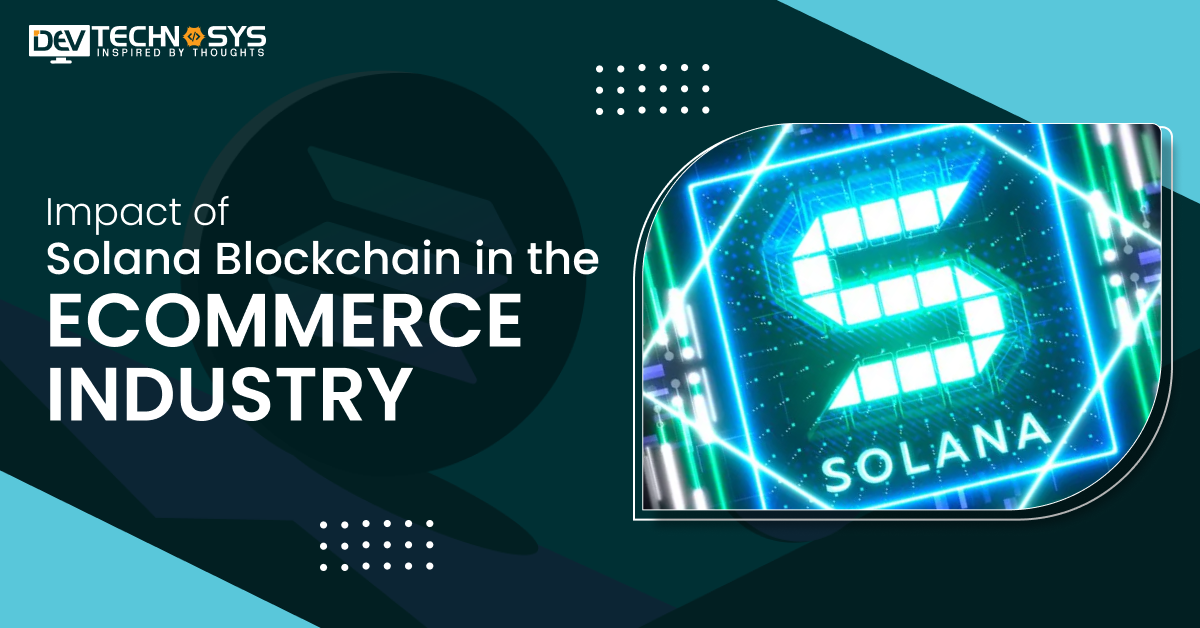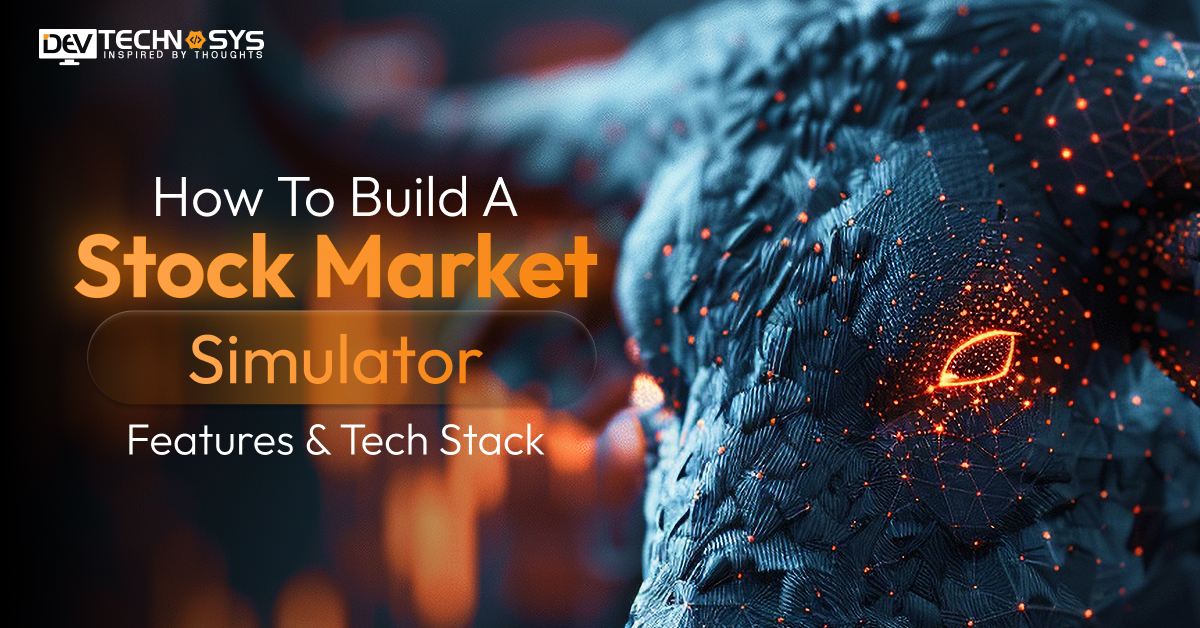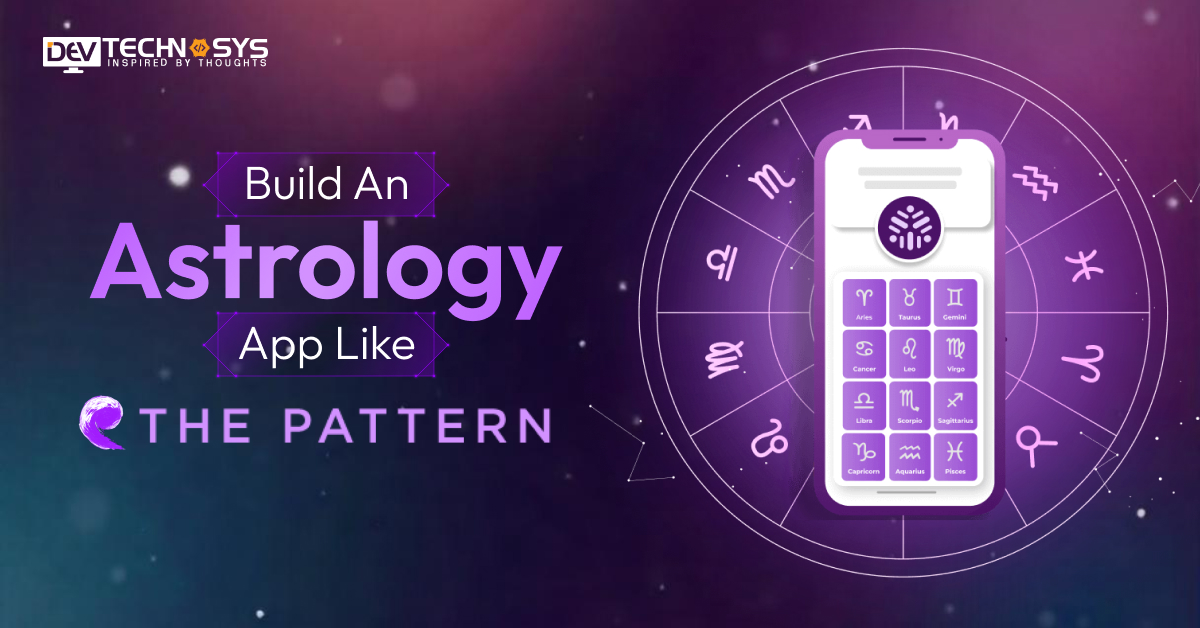Up until now, the way blockchain has changed many industries and the way businesses conduct their daily tasks by using clear, reliable, and specific use cases.
However, eCommerce doesn’t stay the same. Statista says that in 2021, retail e-commerce sales around the world were worth about $4.9 trillion. In the next four years, this amount will likely grow by 50%, hitting $7.4 trillion by 2025.
Therefore, the question becomes, what innovations can improve efficiency in the e-commerce sector? Solana blockchain in ecommerce industry is the answer.
In 2007, Nokia, for example, was the leader in making cell phones. There was an iPhone 1 release by Apple in the same year. Does anyone remember Nokia? Apple is in all kinds of news stories.
The same thought goes into e-commerce. It is possible that new technology will lead to the breakup of monopolies. It’s Solana blockchain technology again!
So, let’s start the blog!
Quick Summary: This in-depth guide discusses the steps, features, costs, impacts of solana blockchain in ecommerce industry. It also covers use cases, challenges and other aspects.
What is a Blockchain Ecommerce Platform?
A blockchain ecommerce platform is essentially an online marketplace that leverages blockchain technology to facilitate transactions and manage data.
Unlike traditional ecommerce platforms that rely on central authorities, blockchain development platforms operate on a decentralized network of computers.
With the Solana blockchain in ecommerce industry, every transaction is recorded on the blockchain, making it publicly verifiable. This transparency reduces the risk of fraud and increases trust among buyers and sellers.
Future Predictions & Projections of Blockchain Industry
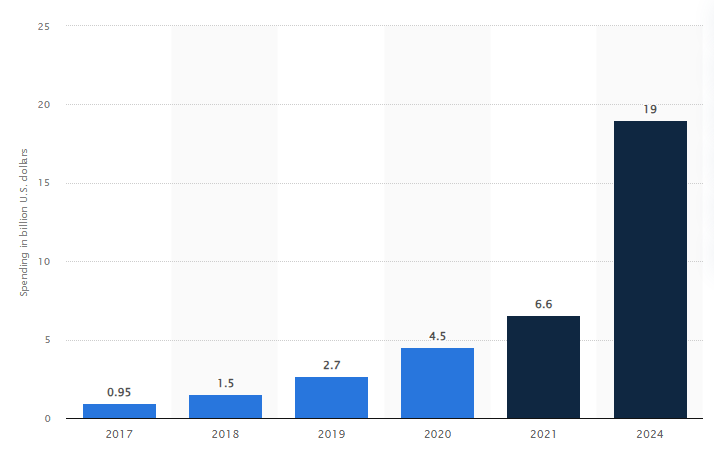
- Over 464 million Solana tokens had been made and were in use by July 2024, but new coins came out slowly.
- At first, a prediction from June 2022 said that “blockchain technology” would hit $1,235 billion by 2030, growing at an annual rate of 82.8 percent. With a CAGR of 56.1%, a more recent prediction from December 2023 says it will be worth $943 billion in 2032.
- Solana blockchain in ecommerce industry is projected to have a market size of about $0.87 billion around the world in 2023. At an average rate of 88.74% per year, it will hit $11.10 billion by 2026.
- By 2023, the U.S. real estate market did not see blockchain as a major threat.
- The market for blockchain technology was worth $17.46 billion in 2023, and it’s projected to keep growing at a rate of 87.7% per year until 2030.
- Solana is a coin that is linked to Decentralized Finance, or DeFi. In the summer of 2021, its market cap grew by 400%.
How Does Solana Blockchain Ecommerce Platform Work?
Ecommerce works great on Solana’s fast and efficient blockchain. Based on what the ecommerce app development company says, this is how Solana-based ecommerce systems work:
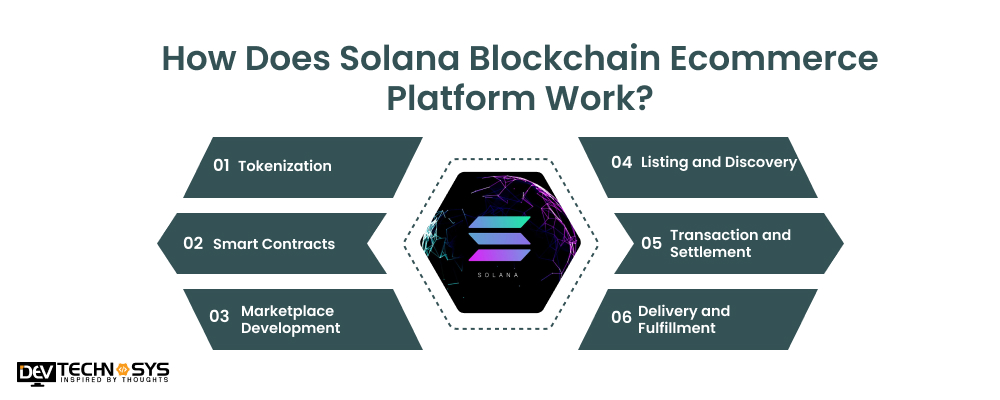
1. Tokenization
To begin, items are shown on the Solana blockchain as digital tokens. These tokens are unique assets that can’t be changed into anything else. Users can buy, sell, or trade them.
2. Smart Contracts
As of now, smart contracts are agreements that are automatically made and have their rules put into code. They simplify the process of buying and selling, which makes it safe and clear.
3. Marketplace Development
After that, hire mobile app developers to use the Solana blockchain to set up online markets. These markets are places where buyers and sellers can meet and do business.
4. Listing and Discovery
From now on, sellers can put their tokenized goods on the marketplace. It has information like price, descriptions, and pictures. The users can look through the market to find different things.
5. Transaction and Settlement
A smart contract is set off when a person buys a tokenized thing. It makes sure the payment is valid, gives the buyer control of the token, and updates the seller’s stock.
6. Delivery and Fulfillment
In the end, the users get their order according to the shipping terms that were agreed upon. This step usually talks about the old ways of shipping and operations.
“To develop a blockchain application, our team partnered with Dev Technosys. Their team was excellent beyond measure. Because of their proficiency with both UX design and blockchain app development, we were happily impressed by the well-designed, easy-to-use application that they created. The audience is quickly adopting our app as their preferred platform, and user engagement has increased. We have nothing but praise for Dev Technosys.”
— Claudia Jonas!
How To Develop a Solana Blockchain Ecommerce Platform?
To use solana blockchain technology to create a mobile app for ecommerce, you need to really think through your strategy and plan your steps. Therefore, it is crucial to have expert guidance while developing an e-commerce app. First, let’s examine the steps involved in developing an app with the Solana blockchain in ecommerce industry.
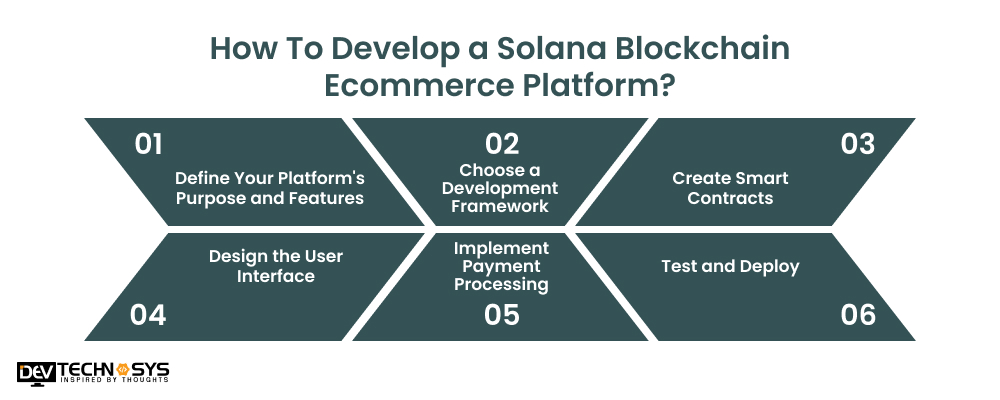
1. Define Your Platform’s Purpose and Features
Start by describing the precise objectives of your e-commerce platform in unambiguous terms. You must hire blockchain developers to establish your target market, the kinds of goods or services you’ll be offering, and the key elements you wish to include. Take into account elements like order fulfillment, inventory control, payment processing, and customer service.
2. Choose a Development Framework
You should choose a good tech stack that makes development on the Solana blockchain in ecommerce industry easier. Solana Web3.js, Rust, and Anchor are popular choices.
These frameworks offer pre-built parts and instruments that speed up development and guarantee Solana blockchain compatibility inside the ecosystem of the e-commerce sector.
3. Create Smart Contracts
Self-executing contracts with terms directly encoded into code are known as smart contracts. Create smart contracts to manage essential tasks like updating inventories, receiving payments, and generating and maintaining items.
Rust, which is the programming language used by the e-commerce business, works well with Solana blockchain to write smart contracts that are both fast and safe.
4. Design the User Interface
The ecommerce web development company makes the interface easy to understand and use so that customers can quickly browse goods, place orders, and handle their accounts.
The user interface should work well with the ecommerce blockchain technology underneath, making buying easy. When building the front end, you might want to use design tools like React or Vue.js.
5. Implement Payment Processing
You can add a secure payment gateway method that works with Solana coins and other cryptocurrencies. You could use Solana Pay or one of the many other payment options that work with the Solana blockchain in ecommerce industry. To build trust among users, make sure that transactions are processed quickly and safely.
6. Test and Deploy
Test your platform thoroughly to find and fix any bugs or other problems. Make sure that smart contracts, payment handling, and the general user experience all work well by testing them thoroughly.
Once you’re happy with how it works, you can move your e-commerce app to Solana. But it is vital to regularly update your app. For that, you can avail the ecommerce website maintenance services for smooth app functioning.
How Will Solana Blockchain Transform the eCommerce Sector?
Blockchain and ecommerce apps work together to create an economic network that helps both users and online shops. Online stores find new ways to serve their customers when they use distributed ledger technology in their work.
The Solana blockchain can be used to make the shopping experience better for customers in the e-commerce business. Here is a list of some of the best ecommerce applications that Solana blockchain will make.
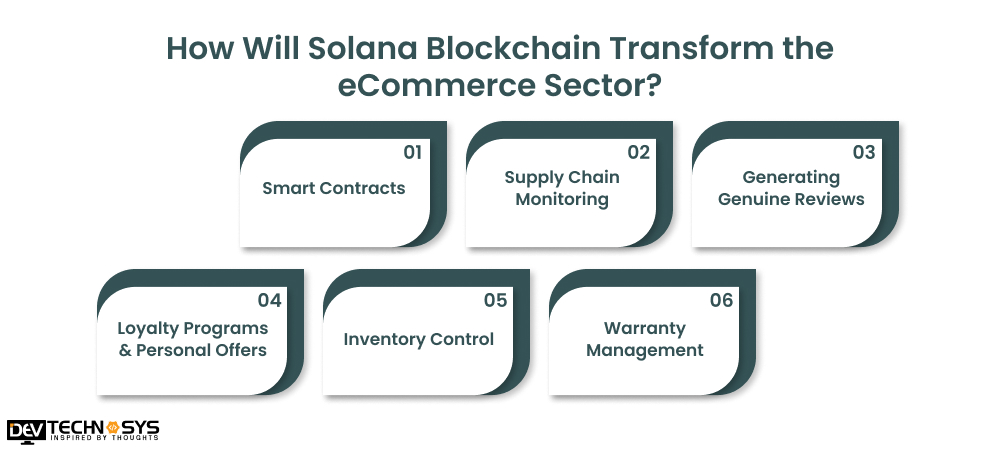
1. Smart Contracts
The smart contract works automatically by following rules that have already been set. Since smart contracts are kept on Solana blockchains, they can handle e-commerce tasks automatically.
E-commerce businesses can grow by cutting down on the cost to hire blockchain developers to do work. Smart contracts can also make it easier to keep track of supplies. It will be easy for online sellers to keep an eye on their stock.
2. Supply Chain Monitoring
Building a reliable supply chain can help online stores reach their business goals. Supply chains let store owners know what items are on their way and when they will arrive. Supply chains also help business owners check the goods that sellers are selling.
Using the Solana blockchain in ecommerce industry to track the supply chain in the business could stop vendors from swapping certain goods and make things more clear.
3. Generating Genuine Reviews
Blockchain technology in ecommerce can be used by online business owners to make sure that customer reviews are real. Reviewers of Internet goods and services aren’t sure how reliable most of them are.
E-commerce companies need reliable reviews and ratings for their products to keep their good name, so they can use Solana blockchain technology to make scores that are real.
4. Loyalty Programs & Personal Offers
By using solana blockchain technology in their business, online stores can easily give their customers prize points that they can cash in after making a certain number of purchases. A lot of online stores have stated that these prize points can be used on different online stores.
You must know that the impact of eCommerce industry on web help buyers can also get special deals and offers from stores. Businesses that sell things online can get more customers and give more products by using reward programs.
5. Inventory Control
One place where Solana blockchain can be very helpful is inventory control. Using standard shopping carts, for example, businesses can cut down on their stock, but they can also order new goods when certain conditions are met. This makes sure that the online store never runs out of stock and also keeps extra items from building up.
6. Warranty Management
Users and businesses are often annoyed that they can’t find their paper records or make sure their warranties cover what they bought. When stores use the Solana blockchain in ecommerce industry, they can quickly and easily store guarantee paperwork.
The data will be open to all parties, including manufacturers, retailers, and users. This will make guarantee data easy to find and check.
Interested in a chatbot demo, pricing, or more info? Fill out the form our expert will contact you shortly.
Chatbot Demo
Cost to Develop an app
Industry Report
Case Study
Challenges of Developing Ecommerce App With Solana Blockchain
E-commerce apps can benefit from Solana, a fast blockchain platform. But when making such an app, there are also some challenges to think about:
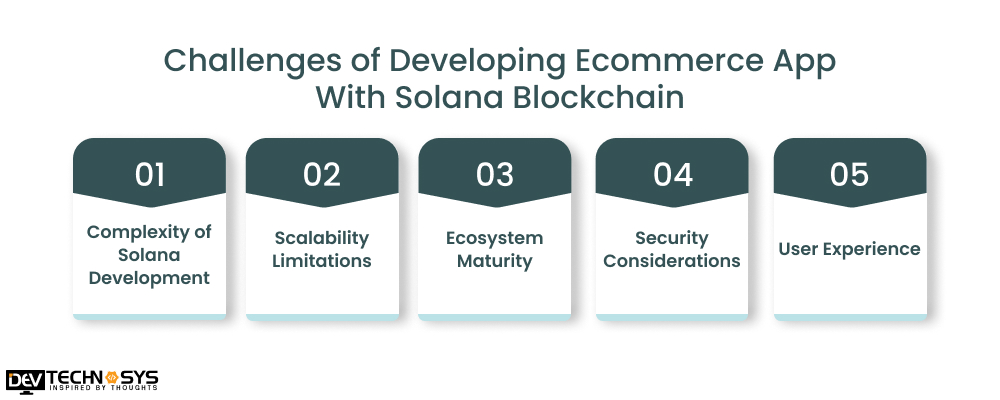
1. Complexity of Solana Development
The blockchain development services provider may need some time to get used to Solana’s unique design and code language. This could make the development process take longer and cause problems when it’s put into place.
2. Scalability Limitations
Solana is known for having a high processing rate, but it may not be able to handle a lot of traffic. You need to make sure the app can handle a lot of users at once, and keeping it running smoothly can be hard.
3. Ecosystem Maturity
The Solana blockchain in e-commerce industry is becoming more important, but it may still be missing some tools, libraries, and services compared to blockchains that have been around longer. This could slow down growth or mean that custom solutions are needed.
4. Security Considerations
The Solana blockchain in ecommerce industry is naturally safe. But vulnerabilities can still happen because of bad application or outside causes. It is vital that blockchain development for hire add security features in the app that protects it from possible risks.
5. User Experience
When adding Solana to an e-commerce app, the user experience needs to be carefully thought through. Users might need to know about blockchain or have access to a Solana wallet in order to buy something, which could make the process more difficult.

Benefits of Solana Blockchain in eCommerce Industry
Solana is a fast blockchain tool that has many benefits for the eCommerce industry. Its special features and abilities could completely change how online shopping and managing the supply chain are done. Here are some key benefits of solana blockchain in eCommerce industry:
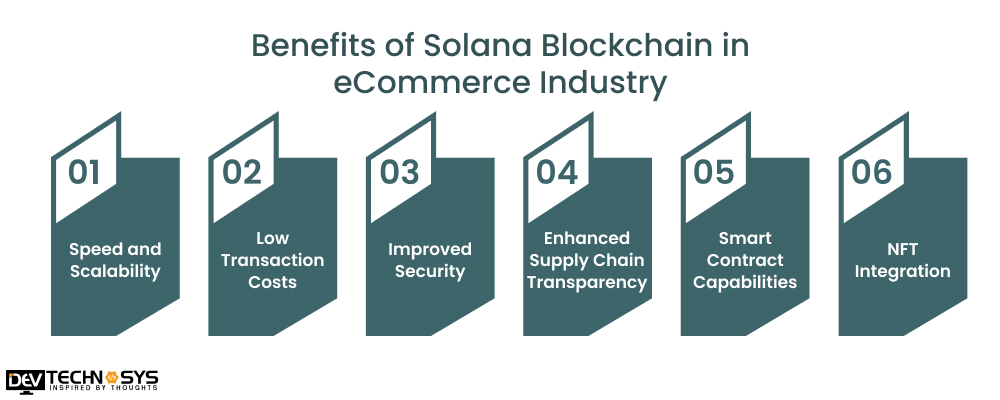
1. Speed and Scalability
- Nearly rapid transactions: Solana’s unique consensus method makes transactions happen very quickly, making shopping easy for customers.
- High throughput: The platform can handle a lot of deals per second, which makes it perfect for eCommerce apps that need to handle a lot of activity.
2. Low Transaction Costs
- Less expensive: Solana blockchain is much cheaper for transactions in the e-commerce industry than other blockchains. This saves money for both companies and users.
- Increased affordability: Lower fees can help bring down the total cost of doing business online, which could mean lower prices for customers.
3. Improved Security
- Records that can’t be changed:Solana blockchain in ecommerce industry makes sure that transaction records can’t be changed. This makes it hard for hackers to change or mess with data.
- Better trust: Solana’s protection and openness can help businesses and customers trust each other more.
4. Enhanced Supply Chain Transparency
- Track where a product came from: Solana blockchain for ecommerce can be used in the e-commerce business to track goods all the way through the supply chain. You can hire ecommerce website developers to make the app more clear and reliable.
- Reduce fakes: Solana can help lower the number of fake goods by tracking them from where they are made to where they are bought.
5. Smart Contract Capabilities
- Processes that are automatically carried out: Smart contracts can be used to automatically carry out different parts of eCommerce, like delivery, payments, and returns.
- Less human mistake: Smart contracts can help reduce human error and boost speed by cutting down on the need for manual work.
6. NFT Integration
- Unique digital assets: As a unique digital asset, Solana blockchain in ecommerce industry lets you make and sell NFTs, which can stand for digital goods or collectibles.
- Fresh ways to make money: NFTs can give companies new ways to make money and interact with customers.
Use Cases of Solana Blockchain in eCommerce Industry
Solana blockchain trends have made their way into e-commerce, with a variety of use cases that show how useful it could be. We will go over these blockchain use cases in ecommerce in great detail to show you how powerful technology can be.
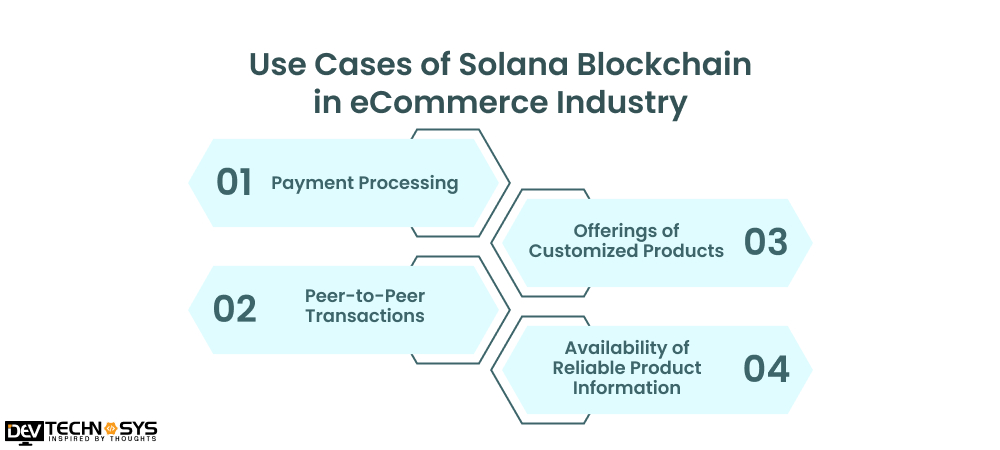
1. Payment Processing
Solana blockchain in ecommerce industry has changed the way payments are processed by making them safe, clear, and quick. The global ledger system is the most important part of blockchain.
It makes sure that all transactions are kept in a public log that can’t be changed. This provides high security and allows for easy tracking. Due to its security, speed, low cost, and openness, private blockchain development is being used more and more in the e-commerce business to process payments.
2. Peer-to-Peer Transactions
Solana blockchain in ecommerce industry lets people do business with each other directly, without going through middlemen. Businesses can use this benefit to set up an autonomous market where buyers and sellers can meet and do business.
This makes the exchange of things and services easier and faster. In this way, it cuts down on costs and boosts productivity.
The stellar blockchain development technology can also make e-commerce more open to everyone. It gives you chances if you can’t pay the fees for regular blockchain and e-commerce platforms.
3. Offerings of Customized Products
Solana blockchain in the e-commerce business lets confirmed customer data be used to customize products. The technology ensures that the customer information used for personalization is correct and reliable.
It also makes it possible to make products that are more unique and attractive. It can make it easier to track down unique products, which is better for everyone. In this way, it also builds trust with customers.
4. Availability of Reliable Product Information
In e-commerce, it’s important to give correct and trustworthy information about your products. Solana blockchain in ecommerce industry can benefit from the technology because it keeps product information safe and can’t be changed.
Customers can find out where the product came from, how it was made, and where it went through the supply chain. This meets the needs of customers who want more and more honesty and trust in the things they buy.
Cost To Develop Solana Blockchain In eCommerce Industry
The complexity of the project is a big part of figuring out the blockchain app development cost. Besides this, there are other things that affect the cost.
Therefore, giving an actual figure won’t work in this case. Also, a normal estimate will be between $10,000 and $25,000, depending on what the project needs. Here is a table that shows how much it costs to make a Solana blockchain app:
Complexity Type |
Cost Estimation |
| Basic | $10000-$15000 |
| Medium | $15000-$20000 |
| Complex | $25000+ |
To get accurate value figures, it is important to get help from a top mobile app development services provider. Keep in mind that growth is only the start. It costs more to get new users, sell the site, make changes, and keep it running.
Conclusion
Solana blockchain technology and e-commerce are interesting because they are open, stable, and save money. Users are at risk when businesses can’t give them something of value.
Even with these benefits, businesses must use Solana Blockchain for long-term success because it has special benefits for online shopping.
Solana blockchain in ecommerce industry could be a great choice for sellers who want to run their business in an open way and handle customer info effectively.
It also cuts down on the need for manual processes that are done on paper and makes sure that crypto deals are safe.
That is why you should consult a blockchain development company if you want to use Solana blockchain technology to build an e-commerce app.
Frequently Asked Questions
1. How Much Does It Cost To Build Solana Blockchain Ecommerce Platform?
The cost to develop solana blockchain ecommerce platform lies between $10000-$25000. Usually, it varies on the basis of your project requirement. So, it is best to consult with an ecommerce website development services provider to know the exact cost to build your solana blockchain eCommerce project.
2. How Long Does It Take To Build Solana Blockchain Ecommerce Platform?
The time to create a solana blockchain ecommerce platform will be around 2-7 months. But many factors affect the time to create a solana blockchain ecommerce app.
3. How To Monetize A Solana Blockchain In eCommerce Industry?
You can make money from a solana blockchain ecommerce platform by leveraging the below methods:
- In-app purchase
- Freemium model
- Subscription model
- In-app advertisement
- Collaboration model
4. What Are The Benefits of Solana Blockchain In eCommerce Industry?
- Speed and Scalability
- Low Transaction Fees
- Enhanced Security
- Transparency and Traceability
5. How Much Will It Cost To Maintain Your Solana Blockchain eCommerce Platform?
The cost to maintain a solana blockchain ecommerce platform will be between 15-20% of the total development. You generally need to pay between $1000-$5000 annually on maintenance.
6. Why Should You Choose Us To Develop A Solana Blockchain Ecommerce Platform?
- Expertise: We specialize in Solana blockchain development and have proven success.
- Customization: Tailored solutions to meet your specific ecommerce platform needs.
- Support: Comprehensive post-launch support ensures your platform’s success.
- Innovation: We stay ahead of blockchain trends to deliver cutting-edge features.
